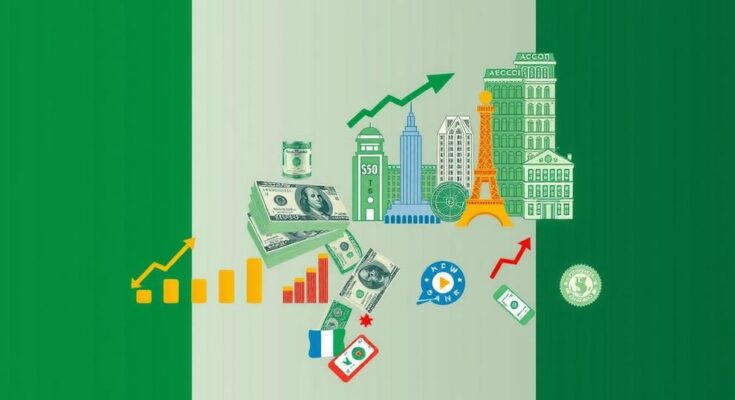The Nigerian government plans to rebase its GDP and CPI by 2025 to include informal sector contributions, aiming to enhance policy accuracy and attract investment. Despite past successes after a similar rebasing in 2014, current economic challenges raise skepticism about the effectiveness of this approach without substantial reforms. Investor confidence is waning amidst soaring inflation and business difficulties, necessitating comprehensive economic restructuring.
The Nigerian government has announced its intention to rebase its Consumer Price Index (CPI) and Gross Domestic Product (GDP) by 2025. This initiative aims to modify existing methodologies for computing these figures, emphasizing the informal sector, which constitutes 60% of the nation’s economic activities. By accurately capturing these contributions, the government hopes to enhance policy efficiency and bolster investor confidence. This rebasing effort is believed to be a significant step towards achieving Nigeria’s aspirational target of a $1 trillion GDP, and it could facilitate reclaiming its position as Africa’s largest economy.
Historically, Nigeria became Africa’s largest economy following a rebasing exercise in April 2014. This exercise nearly doubled Nigeria’s GDP, leading to a valuation of approximately $509.9 billion compared to South Africa’s $370 billion. The late Richard Dowden from the Royal African Society remarked, “Nigeria had always had immense ambition to be the leader of Africa in economic size.” However, there are concerns that such ambitions might be realized through superficial means rather than through substantive economic growth.
In recent developments, the Nigerian Bureau of Statistics (NBS) updated its methodology for measuring unemployment, incorporating casual and self-employed workers. This alteration reportedly reduced the unemployment rate from 33.3% to around 5%, although actual conditions suggest a much higher unemployment rate. The NBS employs the United Nations’ International Standard Industrial Classification of All Economic Activities (ISIC), indicating that Nigeria already aligns with global standards for assessing economic activity. However, it is troubling that Nigeria’s GDP contracted by approximately 31% from 2014 to 2023, casting doubt on the sustainability of economic growth.
Furthermore, despite the advantages of being recognized as a larger economy, international investors prioritize growth potential and business viability over GDP size. Current economic reforms initiated by the new administration have led to significant challenges, including soaring inflation rates and increased business costs, resulting in a loss of investor confidence. The challenges of insecurity, high energy costs, and currency instability have prompted multiple foreign brands to exit the Nigerian market, diminishing the outlook for future investments.
Moreover, the Nigerian government has experienced undeserved accolades for inflated GDP figures post-rebasing in 2014, without establishing the robust economic infrastructure needed to sustain such growth. There is an urgent necessity for a well-structured economic strategy that includes concrete targets, policies, and a mechanism for evaluation. Addressing critical issues related to security, macroeconomic stability, and infrastructure is vital for reviving economic growth in Nigeria.
The re-evaluation and rebasing of Nigeria’s GDP is fundamental in adjusting how the nation’s economic contributions are measured, especially considering the substantial informal sector’s impact. This initiative reflects broader strategies to position Nigeria favorably within the African economic landscape and to sustain investor confidence amid fluctuating economic realities. Historically, Nigeria’s 2014 rebasing propelled it into the spotlight as a major economic player, but subsequent contractions raise questions about the viability and transparency of such figures.
In conclusion, Nigeria’s announcement to rebase its economic indicators is a critical effort towards accurately portraying its economic health and potential. While it aims to boost investor confidence and reclaim economic leadership in Africa, the effort must be complemented by genuine reforms addressing underlying economic challenges. Without a transparent, structured economic strategy and initiatives to resolve pressing issues such as unemployment and inflation, rebasing may serve as a temporary fix rather than a sustainable solution.
Original Source: punchng.com




